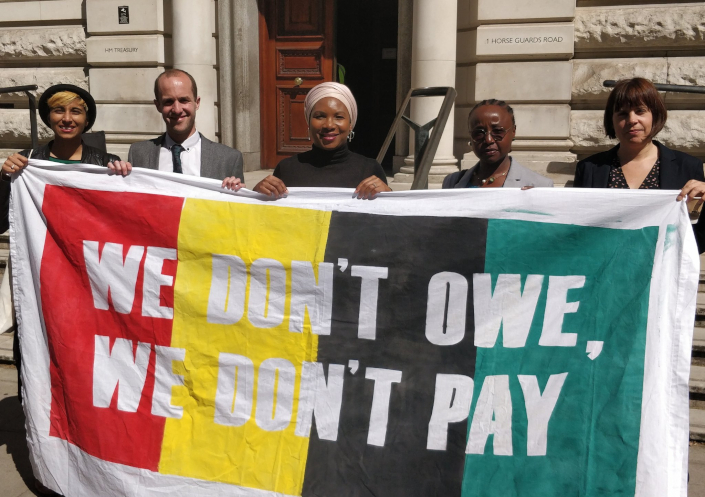Introduction
A fortnight ago in a major victory for our allies The Mozambique Budget Monitoring Forum (FMO), a network of 21 civil society organisations, the Mozambique Constitutional Council ruled one of Mozambique’s three odious loans illegal. However, the Mozambique government had already reached an agreement on paying the debt which originated with this loan, which could see speculators make 240% profit out of Mozambique’s debt crisis.

The illegal loan
In 2013 the London branches of Credit Suisse and VTB arranged a $760 million loan to state-owned company Ematum, which was supposed to be spent on a tuna fishing fleet. However, the fishing fleet accounts for at most half of the money, and the boats sit unused in Maputo harbour. While the loan was publicly disclosed, unlike two other loans at the time, it was not approved by the Mozambique parliament. A court ruling has now confirmed the view of the Budget Monitoring Forum that this made the loan illegal in Mozambique.
The loan to Ematum was subsequently restructured in 2016, transformed into a loan owed directly by the Mozambique government, and then defaulted on. It is unclear what the ruling means for the repayment of this loan, because the terms have changed from the original, but it increases the pressure within Mozambique for the government not to pay. The Budget Monitoring Forum say there is no evidence that this restructured loan was agreed by parliament either.
Moreover, the Budget Monitoring Forum have also asked the Constitutional Council to rule that the two other secret loans, to Proindicus and Mozambique Asset Management, are also illegal. Such a ruling should make it illegal for the Mozambique government to make any payments on them. The loans are already in default and no creditor has yet sued Mozambique in London – the relevant jurisdiction because the loans are owed under English law – for non-payment of the loans.
A new debt restructuring
The Mozambique government has been in negotiation with current owners of the debt which originated with the loan to Ematum. Shortly before the Constitutional Council ruling, a new in principle agreement between Mozambique and the creditors was announced. Under the first in principle agreement creditors could make up to 270% profit from the deal, and the agreement was widely criticised.
The new in principle deal is not much of an improvement.
The original loan was $760 million. Under the new proposal, $900 million would be repaid, plus 5% interest between 2019 and 2023, then 9% interest from then until the debt is repaid. The loan repayment would take place between 2028 and 2031. In total, this means $1.6 billion would be repaid, double what was originally lent. Compared to the first in principle agreement (reached in autumn 2018), Mozambique would pay:
- $7 million a year less in interest until 2023
- $28 million a year more in interest between 2024 and 2027
- the principal sooner, between 2028 and 2031, rather than 2029 and 2033
In cash terms Mozambique would end up paying between $120 million and $620 million less overall, as the previous agreement also contained a clause to pay up to $500 million in gas revenues, which has now been scrapped. However, one of the main reasons for this is because the principal is repaid earlier, so interest stops being paid sooner. So, for the Mozambique government’s cash flow between 2024 and 2031 the deal is worse than before.
The best way to assess the value of the return to investors on this debt is to compare the profits they will make from it with what they would have made if they had invested the same amount of money in US government debt. A company which bought the debt when it was first lent now stands to make 40% more than they originally lent, or 20% more than if they had lent to the US government instead.
However, many of the holders of the debt are not the original lenders and have bought the debts subsequently. For those who bought when Mozambique defaulted in 2016 (when $1 of debt could be bought for 60 cents), they could make 240% profit (compared to if they had lent to the US government instead).
Since the new deal was announced the value of the Mozambique debt on financial markets has increased by 11%. Even if a 2016 buyer of the debt were to sell now, they would still make a profit of 66%.
The Budget Monitoring Forum continue to argue that the people of Mozambique should not have to pay one cent on these debts which were not approved by the Mozambique parliament and which have not benefited the Mozambique people. Paying the Ematum debt in line with the latest in principle agreement would cost hundreds of millions of dollars, and result in large profits for financial speculators.